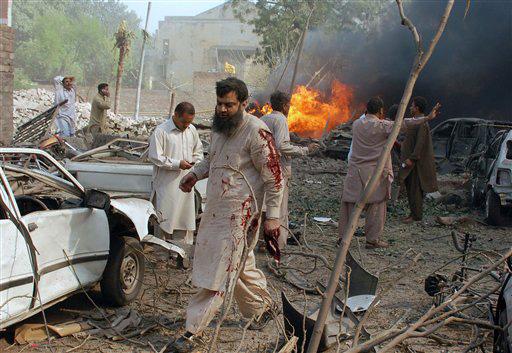24 killed in suicide attacks in Pakistan; more than 200 others wounded

An injured man walks through the site of a suicide bombing at the office of the Federal Investigation Agency, Tuesday, March 11, 2008, in Lahore, Pakistan. Massive suicide bombs ripped through the seven-story police headquarters and a house in Lahore on T The Associated Press
Mar 11, 2008
Last updated on May 12, 2016 at 10:50 p.m.
LAHORE, Pakistan – Massive suicide bombs ripped through a seven-story police headquarters and a business on Tuesday, killing at least 24 people and wounding more than 200 others in attacks that deepened Pakistan’s security crisis.
The two blasts happened about 15 minutes apart in different districts of this eastern city. The first tore the facade from the Federal Investigation Agency building as staff were beginning their working day.
City police chief Malik Mohammed Iqbal said a car packed with explosives was driven into a parking lot and detonated next to the building, which houses a department of the federal police’s anti-terrorism unit.
Twenty-one people were killed, including 16 police and a 3-year-old girl, officials said. The wounded included 32 girls who were hit by flying debris at an elementary school near the police building, doctors at Lahore hospitals said.
Get The Daily Illini in your inbox!
Paramedics carried a bloodied body on a stretcher from the building, while volunteers sifted through the rubble with bare hands, apparently searching for survivors.
Uzair Ahmed, a watchman guarding a bungalow, said he heard a deafening boom and something hit him in the head and face.
“I rushed out in panic … Everybody was running and crying. Smoke was all around and that was it. I only came to my senses in the hospital,” Ahmed, his head bandaged, said from his hospital bed.
Scores of nearby houses sustained major damage. Gates and doors were torn off, windows blown in and air conditioners dislodged and left in the street.
“It was like hell let loose on us,” said homeowner Fazal Muqeem, 42.
Tariq Pervez, the director-general of the Federal Investigation Agency, said it had earlier received information that it could be attacked, but the reports had pointed to an attack against its headquarters in the capital, Islamabad, not in Lahore. He gave no further details.
The second bombing hit an advertising agency at a house in an upscale neighborhood less than 50 yards from a residence owned by Asif Ali Zardari, the widower of slain opposition leader Benazir Bhutto and co-chairman of her party. Zardari was in Islamabad at the time.
Police officials declined to speculate on whether Zardari was the intended target. But Salman Batalwi, chief executive of the SB&B; agency, said he believed the business may have been mistakenly hit.
“Nobody would want to target us. Maybe it’s the wrong address or whatever,” Batalwi told Dawn News television. Police investigator Tasaddaq Hussain said two children and the wife of the house’s gardener were killed.
The bombings come amid a spate of violence that authorities are blaming on Taliban and al-Qaida-linked militants, spreading beyond their strongholds along the Afghan border, and as the victors of last month’s elections prepare to form a new government.
There have been at least seven suicide attacks in the three weeks since the Feb. 18 vote.
The party of Nawaz Sharif, set to be the junior partner in the incoming coalition, blamed military operations ordered by U.S.-backed President Pervez Musharraf for destabilizing the country and called for him to resign.
“He has carried out indiscriminate operations in the tribal areas that have opened up new fault lines in Pakistani society,” party spokesman Ahsan Iqbal said.
A spokesman for the country’s largest Islamic group, Jamaat-e-Islami, blamed Musharraf’s friendship with the U.S. for a campaign of attacks inside Pakistan.
“It started when we started having a friendship with America. There were no suicide bombings in this country before that,” Syed Munawar Hasan told Dawn News television service. “Unless there are whole domestic and foreign policy changes, I don’t think this is going to stop.”
Musharraf condemned the “savage” bombings and said they “cannot deter” the government’s resolve to fight the scourge of terrorism “with full force,” according to a statement carried by the state-run Associated Press of Pakistan.
After the attacks, small groups of city residents enraged by the bombing gathered on Lahore’s main Mall Road, chanting “Musharraf is a dog, Musharraf is a pimp.” Police were deployed to keep order but no trouble was reported.
Until recently, Lahore had been spared the suicide attacks that have struck all other major cities in the past year.
But now it has suffered three attacks within two months. On Jan. 10, a militant walked into a crowd of police guarding a courthouse and blew himself up, killing 24. A double suicide attack in Lahore killed four people at a navy training college last week.
Tuesday’s violence was the first major act of terrorism since Sharif’s and Bhutto’s parties announced over the weekend they would form a coalition government after routing Musharraf’s allies in the Feb. 18 parliamentary elections.
The parties are vowing to restore judges axed by Musharraf to secure his own re-election last year – setting them on a collision course with a key U.S. ally in its war on terror.
Associated Press writers Munir Ahmad, Sadaqat Jan and Zarar Khan in Islamabad contributed to this report.





